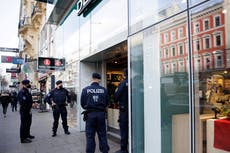Germany warns tighter Covid restrictions needed to curb ‘dramatic’ fourth wave
Surge in infections is being blamed on the ‘very contagious’ Delta variant of coronavirus
Tighter Covid rules are needed to curb Germany's spiralling infection rate, the country's health minister said as he warned that the pandemic in some regions has moved from "serious" to "dramatic".
As hospitals continued to fill up and the rate of transmission rocketed to 399.8 per 100,000 people on Tuesday - the 16th straight day it has hit a record level, according to the Rober Koch Institue - Jens Spahn called for further rules to restrict access to public spaces such as bars and restaurants.
With Germany battling a fourth wave blamed on the "very contagious Delta variant", Mr Spahn suggested that access to such areas should be restricted to those who were vaccinated or recently recovered from Covid and also had a negative test.
Germany's federal system of government means that individual states decide their own Covid rules. National lockdowns have been imposed in the past and Mr Spahn did not rule out following neighbours Austria into another shutdown to stem rising cases, although he said this would be decided on a region-by-region basis.
Saxony in eastern Germany and Bavaria, in the southeast, have already taken matters into their own hands by cancelling events such as Christmas markets.
The eastern state of Brandenburg decided that children no longer have to go to school and is starting its Christmas holidays three days early.
"The situation is not only serious, in some regions in Germany it is now dramatic," Spahn told German Radio. "We are having to move patients around as the intensive care units are full and that doesn't just affect COVID-19 patients."
On Monday,Mr Spahn said that by the end of the winter almost everyone in Germany would be "vaccinated, recovered or dead".
His comments came as the US State Department warned Americans not to travel to Germany due to the “very high level of Covid-19" there.
The warning was issued after the Centers for Disease Control and Prevention issued a statement to “avoid travel to Germany. If you must travel to Germany, make sure you are fully vaccinated before travel.”
“Because of the current situation in Germany, even fully vaccinated travellers may be at risk for getting and spreading Covid-19 variants,” the CDC warned. The same level of travel warning applies to the UK Austria, the Netherlands, Slovakia, Denmark and Norway among other European countries.
Germany is just one of several countries across Europe - now considered the epicentre of the pandemic - to experience surging infections.
Austria entered a 10-day lockdown on Monday while protests against tighter restrictions broke out in the Netherlands and a host of other EU countries.
Germany is also dealing with concerns about the supply of the BionTech/Pfizer vaccine. The company has brought forward the delivery of one million doses originally planned for December, Mr Spahn told health ministry officials on Monday, according to two government sources.
That would enable it to deliver 3 million instead of 2 million doses next week as people rush to get booster shots and appointments at vaccine centres are booked out.
Whether it would affect the total number of vaccines assigned to Germany for the rest of the year remained to be decided, the sources said.
Outgoing German chancellor Angela Merkel also issued her own Covid warning, saying that the current rules are "not enough" to tackle the fourth wave.
“We have a highly dramatic situation — the current rules are not enough,” she told a meeting of leaders of her conservative Christian Democratic Union Party.
"What is in place now is not sufficient,” Ms Merkel added.
The force of the pandemic's fourth wave has prompted more politicians to back compulsory vaccinations, a divisive topic that is likely to face Germany's new government. Only 68 per cent of the population are fully vaccinated.
Some 7.3 per cent of citizens have had a booster and while long queues have formed in many places for a third shot, Spahn has tried to allay concerns about supply.
"Compulsory vaccination is not a violation of civil liberties, but the prerequisite for us to regain our freedom," wrote the premiers of the southern states of Bavaria and Baden-Wuerttemberg in the Frankfurter Allgemeine Zeitung daily.
The ALM association of medical laboratories said capacity for PCR testing was reaching its limits with nationwide utilisation at 86 per cent, up from 75 per cent in the previous week, while the number of positive PCR tests had jumped by 31 per cent.
The total number of coronavirus deaths in Germany is approaching 100,000.
Join our commenting forum
Join thought-provoking conversations, follow other Independent readers and see their replies
Comments


Bookmark popover
Removed from bookmarks